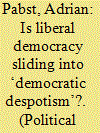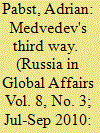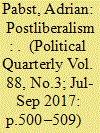| Srl | Item |
| 1 |
ID:
144839


|
|
|
|
|
| Summary/Abstract |
Post-democracy and cognate concepts suggest that the postwar period of democratisation has given way to a concentration of power in the hands of small groups that are unrepresentative and unaccountable, as exemplified by the rise of multinational corporations and their influence on democratic politics. This article goes further to argue that this does not fully capture the triple threat facing liberal democracy: first, the rise of a new oligarchy that strengthens executive power at the expense of parliament and people; second, the resurgence of populism and demagogy linked to a backlash against technocratic rule and procedural politics; third, the emergence of anarchy associated with the atomisation of society and a weakening of social ties and civic bonds. In consequence, liberal democracy risks sliding into a form of ‘democratic despotism’ that maintains the illusion of free choice while instilling a sense of ‘voluntary servitude’ as conceptualised by Tocqueville.
|
|
|
|
|
|
|
|
|
|
|
|
|
|
|
|
| 2 |
ID:
100602


|
|
|
| 3 |
ID:
155422


|
|
|
|
|
| Summary/Abstract |
Brexit and support for anti-establishment insurgencies suggest that British politics is moving away from the old left–right opposition towards a new divide between the defenders and detractors of progressive liberalism. As this article suggests, progressive liberalism differs significantly from both classical and new liberalism. It fuses free-market economics with social egalitarianism and identity politics. Both the hard left and the radical right reject this combination and want to undo a number of liberal achievements.
|
|
|
|
|
|
|
|
|
|
|
|
|
|
|
|
| 4 |
ID:
117459


|
|
|
|
|
| Publication |
2012.
|
| Summary/Abstract |
How to theorise religion in International Relations (IR)? Does the concept of post-secularity advance the debate on religion beyond the 'return of religion' and the crisis of secular reason? This article argues that the post-secular remains trapped in the logic of secularism. First, a new account is provided of the 'secularist bias' that characterises mainstream IR theory: (a) defining religion in either essentialist or epiphenomenal terms; (b) positing a series of 'antagonistic binary opposites' such as the secular versus the religious; and (c) de-sacralising and re-sacralising the public square. The article then analyses post-secularity, showing that it subordinates faith under secular reason and sacralises the 'other' by elevating difference into the sole transcendental term. Theorists of the post-secular such as Jürgen Habermas or William Connolly also equate secular modernity with metaphysical universalism, which they seek to replace with post-metaphysical pluralism. In contrast, the alternative that this article outlines is an international theory that develops the Christian realism of the English School in the direction of a metaphysical-political realism. Such a realism binds together reason with faith and envisions a 'corporate' association of peoples and nations beyond the secularist settlement of Westphalia that is centred on national states and transnational markets. By linking immanent values to transcendent principles, this approach can rethink religion in international affairs and help revive grand theory in IR.
|
|
|
|
|
|
|
|
|
|
|
|
|
|
|
|